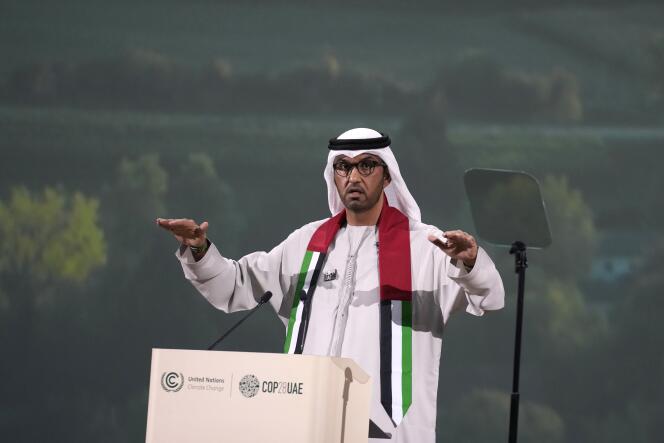


The president of the 28th World Climate Conference (COP28) fought back Monday, December 4, after being hit by controversy based on a video published on Sunday by the Guardian. "I am quite surprised with the constant and repeated attempts to undermine the work of the COP28 presidency. We very much believe and respect the science," said Sultan al-Jaber, speaking to reporters.
The video shared by the British newspaper shows a tense exchange on November 21 between al-Jaber and former Irish president Mary Robinson, the chair of the Global Elders group. "I'm not in any way signing up to any discussion that is alarmist," says Al-Jaber in the video. "There is no science out there, or no scenario out there, that says that the phase-out of fossil fuel is what's going to achieve 1.5°C (...) Show me the roadmap for a phase-out of fossil fuel that will allow for sustainable socioeconomic development, unless you want to take the world back into caves."
On Monday, al-Jaber pointed out that he had trained as an engineer. "Science has been central to my own career progress," he said, "The science says that we must get to net zero emissions by 2050, and we must reduce emissions by 43% by 2030" to limit global warming to 1.5°C, the most ambitious target of the Paris Agreement. Since the opening of COP28 on Thursday, November 30, the presidency has repeatedly stated that the 1.5°C target is its "North Star." He pointed out that he has often said a phase-out of fossil fuels is "inevitable."
Earlier, Majid al-Suwaidi, the director general of COP28, explained that al-Jaber, in the controversial video, was referring to the goal of achieving net zero emissions by 2050, stressing that "it's very clear in all of the scientific reports that fossil fuels are going to be part of that mix."
In its net zero scenario updated in September, the International Energy Agency estimates that fossil fuel production in the power sector must fall by 83% between 2022 and 2050, leaving a residual production of 88 exajoules (EJ) – down from 511 EJ in 2022.
In its report published in March, the Intergovernmental Panel on Climate Change predicts that the use of coal, oil and gas must decrease by around 95%, 60% and 45% respectively by 2050 (compared with 2019) to hope to limit global warming to 1.5°C. Present alongside al-Jaber at the press conference on Monday, Jim Skea, chairman of the IPCC, said that during their conversations, the Emirati leader had been "attentive to the science" and had "fully understood it."
You have 50% of this article left to read. The rest is for subscribers only.
